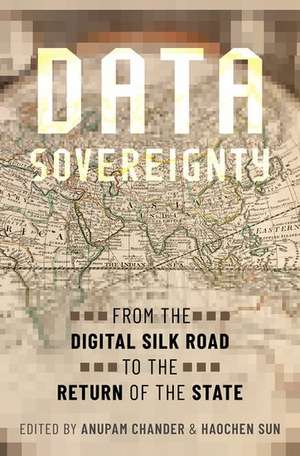Data Sovereignty: From the Digital Silk Road to the Return of the State
Editat de Anupam Chander, Haochen Sunen Limba Engleză Hardback – feb 2024
Preț: 548.25 lei
Preț vechi: 784.18 lei
-30% Nou
Puncte Express: 822
Preț estimativ în valută:
104.92€ • 108.99$ • 87.15£
104.92€ • 108.99$ • 87.15£
Carte disponibilă
Livrare economică 01-07 ianuarie 25
Preluare comenzi: 021 569.72.76
Specificații
ISBN-13: 9780197582794
ISBN-10: 0197582796
Pagini: 408
Dimensiuni: 165 x 224 x 51 mm
Greutate: 0.7 kg
Editura: Oxford University Press
Colecția OUP USA
Locul publicării:New York, United States
ISBN-10: 0197582796
Pagini: 408
Dimensiuni: 165 x 224 x 51 mm
Greutate: 0.7 kg
Editura: Oxford University Press
Colecția OUP USA
Locul publicării:New York, United States
Recenzii
Data sovereignty refers to control over data and can include laws and competition. Digital sovereignty is the state's actions over online access. While they are similar, this book discusses how they are different and how different countries deal with each...This book focuses mainly on the differences between China, the European Union, and the United States....The US has very little regulation of data sovereignty, which mostly occurs at the state level. Recommended.
Notă biografică
Anupam Chander is the Scott K. Ginsburg Professor of Law and Technology at Georgetown University Law Center, and is currently a visiting scholar at the Institute for Rebooting Social Media at Harvard University. His work seeks to ensure that technology helps build a more equitable world. He has been a visiting professor at Yale, the University of Chicago, Stanford, Cornell, and Tsinghua. The author of The Electronic Silk Road (Yale University Press), he has served on the executive council of the American Society of International Law and is a member of the American Law Institute. He is currently a Visiting Scholar at the Institute for Rebooting Social Media at Harvard University.Haochen Sun is a Professor of Law at the University of Hong Kong Faculty of Law and an expert on intellectual property, technology law, and Chinese law. His monograph Technology and the Public Interest (Cambridge University Press) puts forward a new theoretical approach to protecting the right to technology and enforcing technology companies' fundamental responsibilities. His opinions about law and technology have appeared in media outlets, such as BBC News, Forbes, The Los Angeles Times, The New York Times, and The Wall Street Journal. In spring 2023, he served as a Short-Term International Visiting Professor at Columbia Law School.
